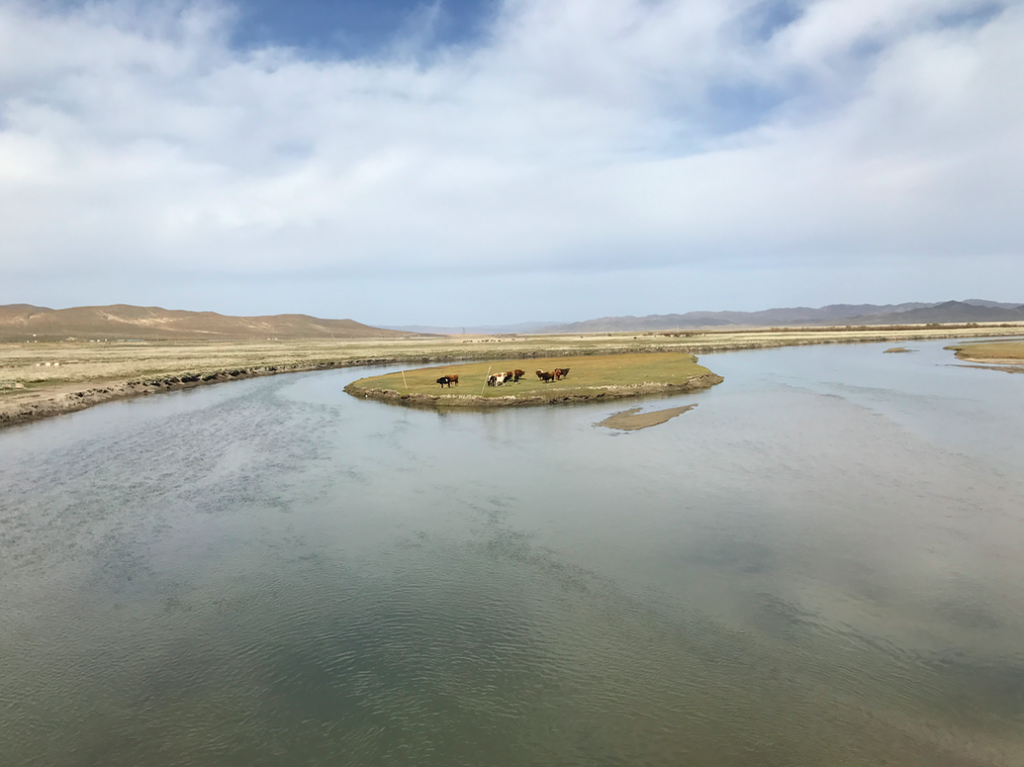
Nameless Island (Elsen Tasarkhai, Mongolia). Island number 23 (out of 100), country number 20 (out of 25), month number 22 (out of 100.)
The island I visited this month is a small, nameless, grass covered islet located in the Tuul river about 280 km outside Ulaanbaatar in Mongolia.
Mongolia, a scarcely populated, landlocked country with big neigbours like China, Russia and Kazakhstan surrounding it.
Mongolia has just 1.9 people per km and considering that over 1 million of the total population of 3 million is living in the capital it feels even less populated once you leave the capital.
“The biggest problem with Mongolia is that we are landlocked.”
The words came from a man I interviewed while visiting Mongolia to launch my book, The Idea Book, in Mongolian.
I told him I disagreed.
It MIGHT have been Mongolias biggest problem, in a time when products, knowledge, people and ideas travelled by sea.
But in the 21st century people travel by air. And knowledge and ideas travel at the speed of light.
That means that no human being needs to be cut off because of being “landlocked” (or “sea locked” in the sense of being “stuck” on an island.)
The thing stopping people from getting information and inspiration from the world is not geographical limitations – but mental limitations.
The people we should be worrying about are not the once who are landlocked – but the ones who are “mindlocked”.
The people who should be inspired by are the people who are openminded and who have borderless thinking.
Chinggis Khan, the famous king who once ruled the world in what was one of the largest kingdoms ever to have been ruled by one king, was one of those open minded and borderless thinkers.
The famous king was born under another name: Temüjin, he became Chinggis Khan” when he became king.
Khan means king or ruler.
And the meaning of Chinggis is absolutely fascinating.
“Chinggis” means “the man who is big as an ocean” (!)
The Mongolians, the land locked of all land locked nations, gave the king a name that likening him to a big ocean…
As an “island man” fascinated by island I thought I would feel isolated, out of place, or confined in landlocked Mongolia, but after spending a couple of days in this vast country I feel the opposite.
The vastness of the plains inspires borderless thinking.
The blue, open sky feeds your imagination and creativity.
The fearlessness and can-do-spirit of the Mongolian people makes me want to do more and fear less. (and their friendliness makes me want to be a kinder person.)
Mongolia might be a landlocked country.
But the country is a catalyst for limitlessness.
As least it was to me.
My visit to Mongolia changed me to the core.
I am now more open then when I arrived.
I think bigger then before I came here.
I feel more human than I ever have.
I of course wish that Mongolia will learn more from the world and not be limited by thinking that their “landlockedness” hinders them from learning from others.
But I also really wish the rest of the world would learn more from Mongolia, a country that still knows how it is to live in harmony with nature, where mankind hasn’t yet learnt to dominate the landscape. Where people (for the very most part) are both strong, proud AND kind.
As Oyun, a nomadic women I meet just next to the lake said to me: “The nomad (still) have the quality of being human”.
Perhaps that is true.
Perhaps we need to go to places where very few people live to learn how to live like humans.
Fredrik Haren, aka “The Island Man”, plans to visit 100 islands, in at least 25 countries, on at least 6 continents – in less than 100 months. The purpose of this “World Tour of Islands” is to get a better understanding of the world, a deeper understanding of the people who live here and a broader understanding of life. The Nameless island was island number 23, country number 20 and month number 22. (Countries visited so far: China, Sweden, Maldives, Austria, Nigeria, Vietnam, Egypt, Indonesia, USA, Malaysia, Thailand, Hong Kong, India, Mauritius, United Kingdom, Ireland, France, Iceland, Canada and Mongolia.)